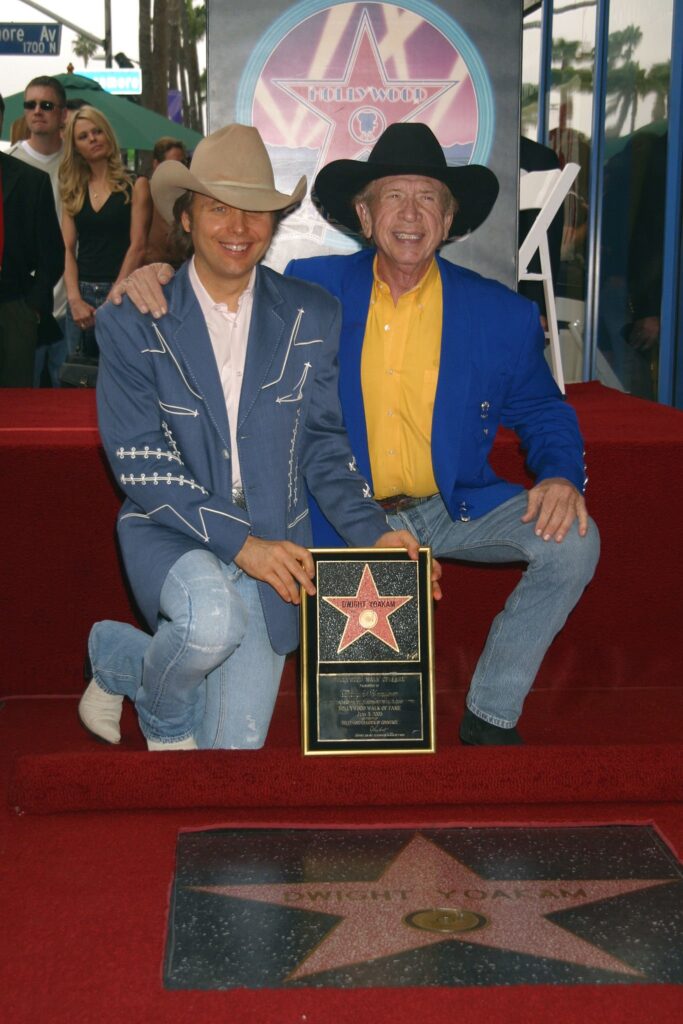
A hand-shake across generations—a border-tinged Bakersfield vow where two voices trade pride for plain truth, and a whole sound comes home to itself.
Essentials up front. Song: “Streets of Bakersfield.” Artists: Dwight Yoakam with Buck Owens. Album: Buenas Noches from a Lonely Room (lead single; album released August 2, 1988). Single release: June 17, 1988. Writer: Homer Joy. Producer: Pete Anderson. Chart peak: No. 1 on Billboard Hot Country Singles (Yoakam’s first U.S. No. 1; Owens’ first since 1972) and No. 1 on RPM Canada; the video was directed by Marcus Stevens and features Tex-Mex color from Flaco Jiménez on accordion.
What gives this record its lasting warmth is the story baked into its groove. The song began as a Homer Joy composition in the early ’70s, cut by Buck Owens in 1973 and tucked onto his Capitol LP Ain’t It Amazing, Gracie—a title that would mean little to casual radio fans but everything to Bakersfield die-hards. It never became a big hit then. Fifteen years later, a young Angeleno with a Kentucky drawl—Dwight Yoakam—went straight to the source, asked his hero to sing it with him, and suddenly the city that had once defined country’s rougher edge had a new national anthem. That arc is documented in Joy’s own telling of the tune’s birth (blisters on his heels, a stubborn walk, a morning audition that turned into a session) and in the discographies that park the original on Owens’ 1973 album.
Put the needle down and you hear craft serving history. Yoakam and producer-guitarist Pete Anderson keep the recording tight and air-bright—Telecaster snap, a rhythm section that walks rather than struts—and then they frame it with Flaco Jiménez’s buoyant accordion, a border flourish that makes the Bakersfield story feel as wide as California itself. It’s not a gimmick; it’s an admission. Bakersfield was always a crossroads—Okie twang meeting roadhouse electricity—and in 1988, this duet added the Tex-Mex lilt that had long been part of the region’s everyday soundtrack. (Jiménez’s role is confirmed both in the album personnel and in biographies of the accordion king.)
Lyrically, “Streets of Bakersfield” is plainspoken defiance: “You don’t know me, but you don’t like me…” It’s a thumbed-ride testimony from someone who’s been sized up too fast, answered with a chorus that refuses the easy judgment. In Owens’ mouth—seasoned, a little wry—the lines carry veteran gravity. In Yoakam’s—younger, eager, a touch nasal—they sound like a credo: let me be myself, and I’ll answer for it on the dance floor, not in your lecture. When those two timbres braid in harmony, you can feel a scene healing itself: a Bakersfield legend stepping out of TV-land memory and back onto radio as a living voice; a modern star tipping his hat without pretending to reinvent the wheel.
The numbers tell the same story. Released in June, the single ran all summer and hit No. 1 on October 15, 1988—Yoakam’s first U.S. chart-topper, and Owens’ first since 1972—then mirrored that feat in Canada. It opened the door for the album’s follow-ups (“I Sang Dixie,” “I Got You”) and cemented Buenas Noches from a Lonely Room as the record where Yoakam’s West-coast honky-tonk met the mainstream on its own terms.
Listen to the production choices that make it move. Anderson’s guitars don’t crowd the lyric; they underline it, trading bright figures with Don Reed’s fiddle while the drums and bass keep a two-step pocket you can drive to. The accordion isn’t a novelty line—it’s a counter-melody, answering the vocal as if the street itself were singing back. And the whole thing clocks in under three minutes, a reminder that country can be economical and elegant without sacrificing bite.
There’s also the symbolism of who’s singing. By 1988, Buck Owens was a legend to younger listeners but far removed from his ’60s run of No. 1s. This duet didn’t just hand him another hit; it put him back onstage beside the movement his own Bakersfield sound had helped inspire. Meanwhile, Yoakam—already a star of the New Traditionalist wave—proved he could honor the lineage while keeping his identity intact: lean arrangements, high-lonesome vowels, and a band that plays for the song. That’s why older ears keep this one close. It feels like meeting an old friend in a familiar doorway and realizing you both still speak the same musical language.
Even the video keeps faith with the song’s ethic—no high concept, just faces, streets, and the chemistry of two pros sharing the mic—another small reason the record reads as truthful rather than staged. And that’s the heart of it. “Streets of Bakersfield” doesn’t argue; it invites. It says, walk with me a block or two before you decide who I am. In three tuneful minutes, Yoakam and Owens turn that invitation into a dance, and for anyone who ever found themselves misunderstood—and found a little mercy at a jukebox—this duet still feels like coming home.